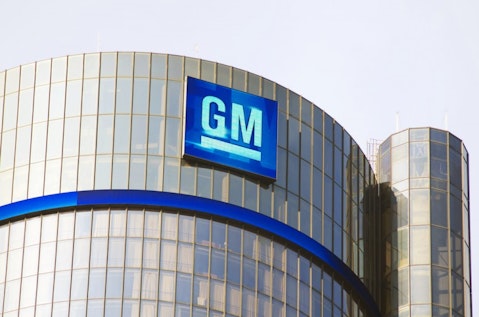General Motors Company (NYSE:GM) does not need too much of an introduction, indeed. The largest US-based automaker has been seriously hit by China’s deepening economic slowdown, and in August saw its biggest fall in sales in the region over the last five months. Even so, the stock is very popular among the hedge funds tracked by Insider Monkey. There were 104 investors within our database that held stakes in General Motors at the end of the second quarter, compared with 103 registered in the prior quarter. At the same time, the overall value of their stakes amounted to $5.78 billion, representing almost 11% of the outstanding stock, down from $6.74 billion quarter-over-quarter. In the following article, we will discuss GM’s recent performance and investors’ expectations regarding the company.

Linda Parton / Shutterstock.com
At Insider Monkey, we track hedge funds’ moves in order to identify actionable patterns and profit from them. Our research has shown that hedge funds’ large-cap stock picks historically underperformed the S&P 500 Total Return Index by an average of seven basis points per month between 1999 and 2012. On the other hand, the 15 most popular small-cap stocks among hedge funds outperformed the S&P 500 Index by an average of 95 basis points per month (read more details here). Since the official launch of our small-cap strategy in August 2012, it has performed just as predicted, returning over 118% and beating the market by more than 60 percentage points. We believe the data is clear: investors will be better off by focusing on small-cap stocks utilizing hedge fund expertise (while avoiding their high fees at the same time) rather than large-cap stocks.
Let’s now discuss on what reputable hedge fund managers think of General Motors Company (NYSE:GM). David Einhorn of Greenlight Capital, the third-largest shareholder of the automaker within our database, mentioned GM in a letter to investors for the first quarter of 2015. According to the letter, Greenlight Capital “decided to take another drive in General Motors” in the first quarter and acquired a new stake at $34.62 per share. The investment firm had owned shares of GM for nearly three years prior to selling its stake in early 2014, when the company’s earnings guidance “disappointed” David Einhorn’s team.
“2015 should be a better year for GM: the company is a year closer to eliminating its losses in Europe; low gas prices should stimulate demand for its highly profitable SUV and light truck product lines; raw material costs are low; and we believe that the worst of the product recalls is behind them. Finally, GM has acknowledged it might not need quite so much cash lying around earning zero interest, and it will begin to buy back shares shortly. While GM also trades at less than 8x 2015 consensus estimates of $4.63 per share, we believe there is an excellent chance that GM can beat those expectations,” Einhorn added.
General Motors’ stock closed the second quarter at $37.50, but they have lost over 20% since then. David Einhorn could have not anticipated China’s disastrous economic pullback, which indubitably has had a significant impact on the company’s stock performance and its top-line in particular. Let’s not forget to mention that David Einhorn’s Greenlight Capital reported owning 14.65 million shares at the end of the second quarter, representing 6.12% of its entire portfolio. Meanwhile, the value of the stake added up to $488.14 million on June 30.
The company saw its sales in China drop for the fourth time in the last five months. More specifically, GM and its China joint ventures sold 248,815 vehicles last month, down by 4.8% year-over-year, which does not imply any prospects for the automaker. The company has lowered its forecasts on the industry-wide demand after spending massive piles of cash to build factories in China, in order to exploit the market that exceeded the one in the US back in 2009. However, China’s economic slowdown is not going to last forever, and sooner or later GM is likely to get more from its investments in China. Meanwhile, the CEO of Fiat Chrysler Automobiles N.V. (NYSE:FCAU), Sergio Marchionne, recently claimed that a merger with General Motors was a “high priority” for his company, while a potential deal could also represent one of the best strategic options for GM. The board of General Motors has already rejected a merger proposal from Fiat Chrysler earlier this year, but that does not mean the Italian-American automaker will stop from achieving its “high priority” goal. Nevertheless, despite facing harmful transitory challenges, GM has repeatedly expressed its position on the matter: the company simply prefers to operate alone.
To conclude, it seems that Greenlight Capital did not “drive in” GM at the right time, but that does not imply they make the wrong move. The company might achieve its much needed turnaround should the concerns about China’s economic slowdown diminish. In the meantime, Warren Buffett’s Berkshire Hathaway, the largest shareholder of General Motors Company (NYSE:GM) within our database, holds 41 million shares as of June 30, which could serve as another indicator that the automaker has a strong long-term outlook.
Disclosure: None




